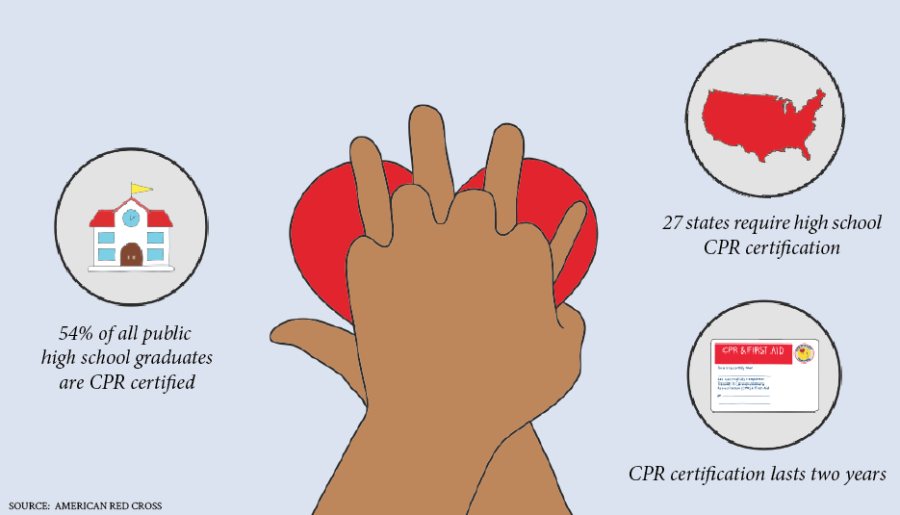Paly students have to contend with so many acronyms — MRC, SSRC, SAT, ACT, APUSH, GPA and SCVAL, to name just a few. Now, there’s one more: CPR.
Learning Cardiopulmonary Resuscitation has become an official graduation requirement. Due to a bill passed by California to implement emergency procedure training in high schools, CPR training is required to graduate and has been in effect since the 2018-2019 school year.
CPR is an emergency procedure used on someone who has stopped breathing or whose heart has stopped beating.
The technique applies chest compressions and artificial ventilation to preserve intact brain functions of the patient until further measures are taken. This effort usually gives time for a professional team to arrive, at which point the patient will be taken for further treatment.
Living Skills teacher Letitia Burton, who organizes the Paly CPR training sessions, said that it is important for students to be educated about these skills, as they may eventually help students save lives.
“We all need to know how to save lives,” Burton said. “If a person is having a cardiac emergency, (a person with the skill of) CPR can save (their) life. The compressions (that the CPR session trains students to do) keep the heart pumping and the blood circulating into the vital organs and the brain until paramedics get there.”
Because this is only the second year that seniors need CPR training to graduate, Paly’s administration is still figuring out the best way to teach it to all students.
Administration so far has not made CPR training a part of the required Living Skills class. Though the requirements of Living Skills and CPR training are similar, according to Burton, CPR is currently a separate class from Living Skills.
“CPR classes are being set up during tutorials,” Burton said. “Therefore, even if you took Living Skills before the requirement was instituted, you still have to take CPR in order to graduate.”
While acknowledging the difficulties of making such a change, Living Skills teacher Alyssa Bond said that finding an alternative setting for CPR training might be more effective.
“I do think that CPR would do well to be placed in either the Living Skills curriculum or, perhaps, advisory,” Bond said. “However, it would require a lot of logistical work and collaboration with the organizations that offer CPR training and would need to be provided with equitable access for all Paly and Gunn students.”
According to Burton, there have been two CPR training sessions this semester — on Oct. 15 and Nov. 12, and there will be another two next semester on March 10 and 17. All the sessions are held at the Haymarket Theater.
Despite her wish for students to take advantage of the sessions Paly offers, Burton said there are alternative ways to fulfill the CPR training requirement for those who miss or are unable to attend the sessions.
If a student misses the training sessions and is a senior, “he or she will need to do it on his or her own,” Burton said. “There are a lot of CPR classes out there. You can go to the Red Cross and do CPR, but you have to pay for it.”
Senior Jonathan Mi, who has not taken Living Skills or attended the CPR training session at Paly, said that he first learned about the CPR procedure from a camp.
“I went to a YMCA summer camp when I was in 8th grade, where I first heard about CPR,” Mi said. “The head lifeguard in the camp showed us how to do a basic CPR in case of an emergency because we had to swim.”
Mi said CPR can be a useful skill for students after they become adults.
“I think knowing how to do a basic CPR is relevant to students’ post high school life,” Mi said. “If you are a person that likes to swim, both in a pool or at the beach, I think that knowing CPR is useful. This is because you never know when an accident might occur, and if a person cannot breathe, then CPR is a very quick and generally reliable method to save him or her, though it may feel uncomfortable.”
Burton said she advises students to pay attention to Paly’s daily announcements.
“In order to not miss the sessions, students should pay attention to the announcements from InFocus,” Burton said. “I also recommend students to complete this earlier, just like the Living Skills requirement, and not to wait until their senior year.”


CPR Classes Tucson • Jul 14, 2022 at 9:26 am
Thank you for sharing this information.
Jeff Carbine • Jan 20, 2022 at 6:52 am
I like what you said the procedure uses chest compressions and artificial breathing to keep the patient’s brain functions intact while waiting for further treatment. This is a good article, my uncle is looking for info and this should help him. I wanted to thank you for your explanation about CPR classes.